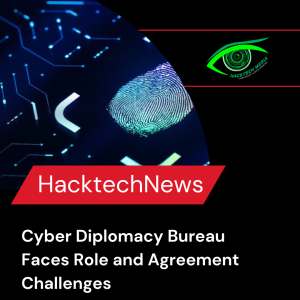
In a recent report from the Government Accountability Office (GAO), growing pains at the Bureau of Cyberspace and Digital Policy have come to light. The GAO found that the State Department is grappling with challenges tied to role definitions and hiring within the new bureau. This revelation underscores the complexities surrounding cyber diplomacy efforts in the United States.
Clarifying Roles and Responsibilities
According to the Thursday report, officials at the Cyber Diplomacy Bureau (CDB) acknowledge ongoing challenges in clarifying roles and responsibilities. With cyber issues intersecting various aspects of diplomacy, effective communication within the State Department becomes crucial. The report emphasizes the need for awareness and visibility to ensure that expertise is fully utilized in addressing cyber policy interests abroad.
Establishment and Recommendations
Established in 2022 after extensive negotiations between Congress and presidential administrations, the CDB was a major recommendation of the Cyberspace Solarium Commission. Nate Fick assumed the role of the State Department’s first ambassador at large for cyberspace and digital diplomacy. Despite these efforts, the GAO highlighted a significant hurdle—the lack of a global agreement on what cyber diplomacy entails, leading to role ambiguity and questions.
Conflicting Roles and Ad Hoc Clarifications
One example of this challenge is the overlap between the CDB’s Digital Freedom unit and the Bureau of Democracy, Human Rights, and Labor. Both units address similar roles in free speech online and fair internet access, causing confusion. The GAO noted that when multiple offices are involved in similar issues, officials resort to clarifying roles on an ad hoc basis to prevent conflicts.
GAO’s Previous Recommendations and Updates
The report also provides an update on previous GAO recommendations to the State Department during the establishment of the cyber bureau. Past concerns included the lack of involvement with other federal agencies working in cyber diplomacy and the failure to demonstrate the use of data and evidence in developing the cyber bureau proposal. The State Department, in response, engaged with multiple agencies to identify risks and implemented information-based improvements.
Foundation for the Defense of Democracies’ Input
In tandem with the GAO report, the Foundation for the Defense of Democracies released recommendations for enhancing diplomacy efforts through cyber capacity building. This underscores the broader importance of a well-defined and collaborative approach in addressing cyber challenges on the international stage.
Tsurugi Linux: Aiding Digital Forensics and OSINT Investigations
Shifting focus, Tsurugi Linux, a customized open-source distribution, is making waves in the digital forensics and OSINT community. Tailored for supporting DFIR investigations, Tsurugi Linux boasts a user-friendly experience, emphasizing live forensics analysis, post-mortem analysis, and digital evidence acquisition.
Tailored OSINT Capabilities
Giovanni Rattaro, Tsurugi Linux’s core developer, highlighted the “OSINT Menu Switcher,” a feature streamlining the user interface for analysts conducting OSINT investigations. This tool allows a dynamic shift in the operational profile, accentuating the focus on OSINT tasks. Additionally, the system offers extensive customization options, ensuring a personalized interface to meet specific investigative needs.
In conclusion, the challenges faced by the Cyber Diplomacy Bureau underscore the intricate nature of cyber diplomacy efforts, while innovations like Tsurugi Linux contribute to advancing capabilities in digital forensics and OSINT investigations.
#CyberDiplomacy #RoleAmbiguity #GovernmentReport #GlobalCyberSecurity #DiplomacyStruggle
Thanks &Regards;Ashwini Kamble
Digital Marketer
